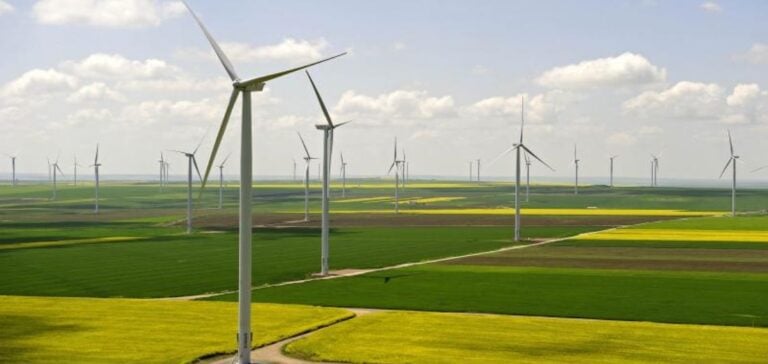Poland has announced a target of 56% renewable energies in its electricity mix by 2030, according to the draft national energy-climate plan presented by the Climate Ministry.
This target, which falls short of the majority party’s election pledge of 70%, remains above the 50% declared earlier this year.
The plan calls for investments estimated at 792 billion zlotys (around $205 billion) to reach this target. The plan, which has yet to be approved by the ministerial cabinet, attempts to strike a balance between increasing the share of renewable energies and gradually reducing the use of coal.
Climate Minister Paulina Hennig-Kloska points out that the cost of inaction on energy transition could outweigh the cost of implementing the planned measures.
Possible adjustments before submission to Brussels
Before being forwarded to the European Commission, the plan must be approved by the government cabinet.
At this stage, modifications are still possible, notably under pressure from the Ministry of Industry, responsible for coal mining, which may wish to protect the interests of the sector.
The Polish government, seeking to reduce its dependence on coal, must also deal with commitments made by the previous administration, such as maintaining mining operations until 2049.
Warsaw-based think-tank Instrat criticizes the current strategy for its lack of ambition on renewables and its prolonged dependence on coal.
According to Instrat, raising the targets for the deployment of green technologies would reduce both dependence on imported gas and, to a lesser extent, local coal.
Emissions reduction and energy efficiency at the heart of the plan
The roadmap calls for a 50.4% reduction in greenhouse gas emissions by the end of the decade, as well as a 16.7% drop in primary energy consumption compared to 2020.
These commitments align Poland with the European Union’s climate objectives, which call for a reduction of at least 55% in greenhouse gas emissions by 2030.
To achieve this, the strategy focuses on accelerated development of renewable energies, particularly wind and solar power, and on improving energy efficiency.
The planned investments will enable us to modernize our energy infrastructures, while guaranteeing the security of supply and stability of the electricity grid.
The economic and political challenges of the energy transition
Poland’s energy transition represents a complex challenge that must juggle reducing dependence on fossil fuels, national energy needs and domestic economic and social realities.
The Climate Ministry is pushing for rapid energy reforms, but the Industry Ministry remains cautious, particularly with regard to the future of coal mines and the social implications of their closure.
The balance to be struck is all the more delicate as Poland seeks to maintain economic competitiveness while meeting its European commitments.
The extent and pace of this transition remain open to debate, and will depend heavily on future political decisions and compromises.






















